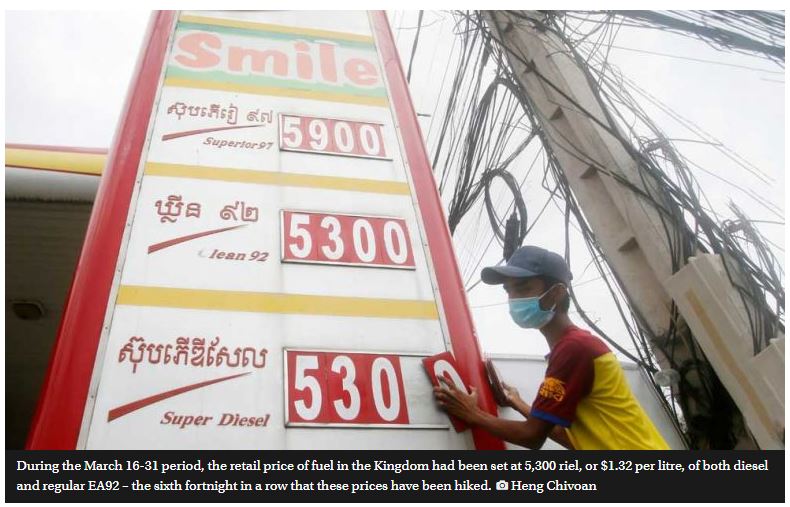Cambodia: New prakas adjusts formula for retail fuel prices
The Cambodian government has issued an inter-ministerial prakas publicising the new formula with which ministries will adjust the retail price of fuel in the Kingdom to better reflect international rates and thereby maintain stability in oil supply.
The Ministry of Economy and Finance, Ministry of Commerce and the Ministry of Mines and Energy on March 22 issued an inter-ministerial prakas, consisting of 12 articles, intended to keep fuel prices “equitable”, according to commerce ministry spokesperson Penn Sovicheat.
The prakas’ chief stipulation is the lowering of the pricing period from 15 days to 10 days. They also named the commerce ministry’s Department of Private Sector Development as being responsible for calculating the retail price of fuel in Cambodia. The department will issue a retail price to oil companies on the 1st, 11th and 21st of each month.
Sovicheat told The Post that the implementation of the new formula would take effect in “early April”, with the new formula set to keep prices in line with international standard.
“Such practices will create equity in the business for both sellers and buyers,” he said.
The spokesperson clarified that other taxes and associated charges, such as customs duties as well as additional and special fees will remain the same.
The new prakas states that the commerce ministry may issue an immediate notice setting out retail prices to fuel companies “every 10 or 15 days as needed” to “create a balance” between the price of fuel in the international market and retail fuel prices in Cambodia to maintain a stable oil supply in the Kingdom.
These inter-ministerial proclamations will remain in force until a new prakas is issued.
Seun Nith, owner of PTT gas station in Dangkor district, Phnom Penh, told The Post that there was a “misconception” amongst some members of the public that the increase in fuel prices would be more profitable for station owners, and noted that this has not proven to be true.
“The retail price of fuel in the market is set by the Ministry of Commerce. No matter how much the oil price rises or falls, the profit that the station owner receives is fixed,” he said. “But when the oil [price] goes up, the problem for the station owners is that they have to fork out twice as much money to buy oil to stockpile [for customers].”
Retail prices of regular-grade petrol and diesel were hiked by 10.4 per cent and 17.8 per cent respectively on March 16, continuing an upward trend that began in January as a result of the threat on the international oil supply brought about by Russian military offensive in Ukraine.
During the March 16-31 period, the retail price of fuel in the Kingdom had been set at 5,300 riel, or $1.32 per litre, of both diesel and regular EA92 – the sixth fortnight in a row that these prices have been hiked.
From March 1-15, the prices were 4,500 riel ($1.11) and 4,800 riel ($1.18) per litre of regular diesel and EA92 respectively, up from 3,750 riel ($0.92) and 4,100 riel ($1.00) during the most recent trough from December 16-31.
The new inter-ministerial proclamation states that all filling stations must have regular petrol and diesel for sale on a regular basis and are not permitted to sell only premium-grade super petrol.
It added that stations found violating the prakas will be issued a transitional fine of four million riel, with a temporary operational suspension to be enforced by the ministry should the flouting continue.
Source: https://www.phnompenhpost.com/business/new-prakas-adjusts-formula-retail-fuel-prices


 English
English




